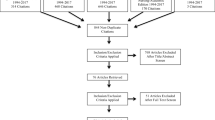Abstract
Perinatal mood and anxiety disorders (PMADs) are one of the most common complications in the peripartum period. The Council for Resident Education in Obstetrics and Gynecology (CREOG) includes diagnosis and management of PMADs as educational objectives, but no formal curriculum for trainees exists. Consequently, providers often struggle to identify and treat these disorders. We aimed to assess the effects of a pilot lecture series on obstetrics and gynecology (OBGYN) residents’ knowledge and comfort in the diagnosis and management of PMADs. As part of an educational cross-sectional study, a Qualtrics survey was distributed to OBGYN residents at a single center in New York City. Residents were exposed to a 10-h virtual lecture series on perinatal mental health, and a follow-up survey was distributed. Initially, few residents were familiar with screening tools (45%), and few felt comfortable providing resources (5–45%), diagnosing (0–55%), and managing (0–30%) patients with the PMADs presented. After the pilot, improvement was seen in residents’ familiarity with screening tools (86%), and their comfort in providing resources (11–67%) and diagnosing (11–78%) PMADs. However, comfort in management did not improve (0–22%). The majority of trainees (75%) found the virtual setting appropriate. There is a deficit in OBGYN residents’ knowledge and comfort regarding diagnosis and discussion of PMADs that can be improved with a focused lecture series, though a greater emphasis on treatment is needed. The majority of OBGYN learners found the virtual setting conducive to learning this material. Their preferences should guide the development of a formal, national curriculum.




Similar content being viewed by others
References
ACOG Committee Opinion No (2018) 757: Screening for perinatal depression. Obstet Gynecol 132(5):e208–e212. https://doi.org/10.1097/AOG.0000000000002927
Byatt N, Biebel K, Lundquist RS, Moore Simas TA, Debordes-Jackson G, Allison J, Ziedonis D (2012) Patient, provider, and system-level barriers and facilitators to addressing perinatal depression. J Reprod Infant Psychol 30(5):436–449. https://doi.org/10.1080/02646838.2012.743000
Byatt N, Xu W, Levin LL, Moore Simas TA (2019) Perinatal depression care pathway for obstetric settings. Int Rev Psychiatry 31(3):210–228. https://doi.org/10.1080/09540261.2018.1534725
Chen Q, Li W, **ong J, Zheng X (2022) Prevalence and risk factors associated with postpartum depression during the COVID-19 pandemic: a literature review and meta-analysis. Int J Environ Res Public Health 19(4):2219. https://doi.org/10.3390/ijerph19042219
Council on Resident Education in Obstetrics and Gynecology Educational Objectives (2020) Core curriculum in obstetrics and gynecology. American College of Obstetricians and Gynecologists, Washington, DC. Retrieved in May 2022 and July 2022 from: https://www.acog.org/-/media/project/acog/acogorg/files/creog/creog-educational-objectives-12th-edition-secured.pdf
Cox EQ, Sowa NA, Meltzer-Brody SE, Gaynes BN (2016) The perinatal depression treatment cascade: baby steps toward improving outcomes. J Clin Psychiatry 77(9):1189–1200. https://doi.org/10.4088/JCP.15r10174
Deave T, Heron J, Evans J, Emond A (2008) The impact of maternal depression in pregnancy on early child development. BJOG: Int J Obstet Gynaecol 115(8):1043–1051. https://doi.org/10.1111/j.1471-0528.2008.01752.x
Ford ND, Cox S, Ko JY et al (2022) Hypertensive disorders in pregnancy and mortality at delivery hospitalization - United States, 2017-2019. MMWR Morb Mortal Wkly Rep 71(17):585–591. Published 2022 Apr 29. https://doi.org/10.15585/mmwr.mm7117a1
Forman DR, O'Hara MW, Stuart S, Gorman LL, Larsen KE, Coy KC (2007) Effective treatment for postpartum depression is not sufficient to improve the develo** mother- child relationship. Dev Psychopathol 19(2):585–602. https://doi.org/10.1017/S0954579407070289
Garabino AH, Kohn JR, Coverdale JH, Kilpatrick CC (2019) Current trends in psychiatric education among obstetrics and gynecology residency programs. Acad Psychiatry 43(3):294–299. https://doi.org/10.1007/s40596-019-01018-w
Leigh H, Stewart D, Mallios R (2006) Mental health and psychiatry training in primary care residency programs. Part I. Who teaches, where, when and how satisfied? Gen Hosp Psychiatry. 28(3):189–194. https://doi.org/10.1016/j.genhosppsych.2005.10.003
McKee K, Admon LK, Winkelman TNA, Muzik M, Hall S, Dalton VK, Zivin K (2020) Perinatal mood and anxiety disorders, serious mental illness, and delivery-related health outcomes, United States, 2006-2015. BMC Womens Health 20(1):150. https://doi.org/10.1186/s12905-020-00996-6
Wisner KL, Sit DK, McShea MC et al (2013) Onset timing, thoughts of self-harm, and diagnoses in postpartum women with screen-positive depression findings. JAMA Psychiatry 70(5):490–498. https://doi.org/10.1001/jamapsychiatry.2013.87
Zhou T, Du S, Sun D et al (2022) Prevalence and trends in gestational diabetes mellitus among women in the United States, 2006-2017: a population-based study. Front Endocrinol (Lausanne) 13:868094. https://doi.org/10.3389/fendo.2022.868094
Funding
This work was funded in part by the Picker Gold Graduate Medical Education (GME) Challenge Grant, which provides 18-month grants to support the research and development of innovative projects within the graduate medical education setting.
Author information
Authors and Affiliations
Contributions
All the authors contributed to the study conception and design. Material preparation, data collection, and analysis were performed by Lindsay Marty, Olivia Myrick, and Allison Perelman. Grant proposal was prepared by Amalia Kotlyar. The first draft of the manuscript was written by Lindsay Marty and all the authors commented on previous versions of the manuscript. All the authors read and approved the final manuscript.
Corresponding author
Ethics declarations
Conflict of interest
The authors declare no competing interests.
Additional information
Publisher’s Note
Springer Nature remains neutral with regard to jurisdictional claims in published maps and institutional affiliations.
Rights and permissions
Springer Nature or its licensor (e.g. a society or other partner) holds exclusive rights to this article under a publishing agreement with the author(s) or other rightsholder(s); author self-archiving of the accepted manuscript version of this article is solely governed by the terms of such publishing agreement and applicable law.
About this article
Cite this article
Marty, L., Myrick, O., Perelman, A. et al. Filling a gap in OBGYN education: a pilot lecture series on perinatal mental health. Arch Womens Ment Health 27, 137–143 (2024). https://doi.org/10.1007/s00737-023-01386-1
Received:
Accepted:
Published:
Issue Date:
DOI: https://doi.org/10.1007/s00737-023-01386-1



